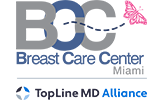Breast Evaluation and Treatment
in Miami FL
Miami office
Pembroke Pines office
Reliability, experience, and staying up to date with changing trends in breast health are vital for providing quality care in treating breast diseases. We at Breast Care Center Miami are dedicated to providing our patients with the best expertise in the field, detailed evaluation, and personalized treatment. We provide a tailored approach to each individual’s specific needs.
Breast Pain
Women at any age are likely to experience breast pain, also known as mastodynia or mastalgia, at some point in their lives. While this ailment is most often benign and self-limiting, it may be a sign of more serious pathology. Patients with breast pain need to be evaluated by a clinician to determine the nature of their breast symptoms.
While it might be your first thought to schedule a breast exam, chances are, the pain is nothing serious and does not require a thorough breast examination.
In essence, the female breasts may become tender and painful for various reasons.
In most cases, the problems can be caused by the following:
- Hormonal disbalances
- Breast injury
- Wearing the wrong bra
- The pain might come from the chest wall
- Breastfeeding may also cause tenderness
- It can also be a medication side effect
- Complications from breast implants
- Harmless cyst formation
- Breast malignancies
Fibrocystic changes
Benign transformations in the breast tissue are commonly called fibrocystic changes. The majority of women will experience some form of this condition, with or without accompanying symptoms such as tenderness and breast pain. The result of this condition is the appearance of lumps, and they typically manifest in the upper part of the bosom.
The glandular tissue of the breasts is primarily affected, and hormones play a great part in this process. Variations in hormonal levels during the cycle cause tissue changes, which can be accompanied by pain and soreness, which increases as the cycle gets closer. These symptoms are often self-regulated and resolve on their own.
While these problems usually aren’t major causes for concern, scheduling a breast evaluation can help rule out any other serious underlying cause. Also, if you regularly attend breast exams, tell your provider about any sudden breast changes.
If you are over 40, consult your provider about the frequency and the number of breast screenings you should have. If you are under 35, a simple breast ultrasound may be enough to take a closer look at your
breast tissue and look for any changes. If the provider finds something suspicious or abnormal, they will recommend further imaging tests and other diagnostic methods.
Breast Lumps
Breast lumps are most commonly referred to as masses when they develop in breasts. Lumps may come in different shapes, sizes, and textures. Some can cause pain, while others remain undetected before the physical exam by a clinician. Due to the ever-changing structures of the breast tissue as they respond to hormones, breast masses are quite common.
The majority of lumps are proven to be benign. However, upon the detection of a lump, it is important to be evaluated by a breast specialist, as a thorough evaluation will be necessary to ensure the correct diagnosis and treatment.
To make sure that every newly discovered mass is nothing to be worried about, scheduling regular breast exams and attending yearly screenings is pivotal for optimal breast health. On the other hand, every time you notice any new changes to your breasts and their structure, you can schedule an appointment with a knowledgeable and compassionate provider, such as our staff members, for a breast evaluation.
Remember, most of these lumps are harmless, and some of them may even resolve on their own. Still, optimal breast health starts with being proactive about your health and attending regular breast exams.
Nipple Discharge or Retraction
Human glands are hormone-regulated, as is the case with breasts. The primary function of the mammary glands is milk production, and as such, they will grow, transform and change in shape and function over time. Nipple discharge is the spontaneous release of fluid through the nipple and should not be confused with nipple secretion, which happens after mechanical stimulation.
While it’s normal to expel fluid upon stimulation, it is advised that anyone with this symptom should have a thorough breast evaluation, especially where there are other obvious observable things pointing toward the fact there might be an underlying issue that needs medical attention.
Retracted nipples are pulled inward, unlike the usual outward-facing shape. This can be a natural variation or consequence of age, mammary duct ectasia, or even cancer. This should also be evaluated by a clinician. And even if, in many cases, it might be nothing concerning, scheduling a breast exam can help give you peace of mind.
Breast Infection
Breast tissue inflammation or mastitis can be secondary to infection-caused either by blocked milk ducts in breastfeeding women or by bacteria. The scenario in which breasts are not completely emptied during breastfeeding can lead to milk duct clogging, ultimately leading to inflammatory conditions. Scheduling a breast exam or general consultation regarding effective breastfeeding practices can help mothers keep their breasts healthy and their babies well-fed.
Another major risk is bacteria that enter the breast tissue through the skin from the external environment. Wearing nipple piercings and smoking tobacco products places you at an increased risk of developing various breast infections. Breast infections may collect into an abscess and require surgical drainage.
Fortunately, with a thorough breast evaluation and proper treatment, there will be no need for any type of surgical intervention.
Autoimmune breast disease and even cancer can mimic breast infections. Therefore, it is important to be evaluated by a breast surgeon.
In most cases, breast infections can be easily avoided by practicing good hygiene and ensuring that your breast health is at optimal levels. Remember, to learn more about these practices; you can always schedule a consultation with us
Gynecomastia
Typical of males, gynecomastia poses as a benign swelling of breasts, which is a result of hormonal imbalance. Patients affected by this condition have an imbalanced ratio of female to male hormones. Namely, the estrogen or female hormone levels are in excess, and the manifestation of this imbalance is breast enlargement.
Depending on age, different reasons are attributed to the appearance of gynecomastia.
In infants, the problem is typically self-regulated and is initially caused by the mother’s estrogen. Transitional or adolescent age sees most patients affected at the age of 14 as a consequence of the increased conversion of male hormones. The last group of elderly adults can see the symptoms due to the reduced production of testosterone.
In the latter case, a thorough breast evaluation may help diagnose gynecomastia but won’t address the hormonal problems directly. In some cases, the enlarged breasts will respond well to hormone-based medication, such as androgens, anti-estrogen compounds, and aromatase inhibitors. In rarer cases, the patient may need to undergo surgery to remove the excess breast tissue.
Abnormal Mammograms
Mammography is the most used diagnostic tool for the early detection of breast cancer in women. Simply put, a mammogram uses X-ray radiological imaging, based on which doctors are looking for potential changes and abnormal parts of the tissue.
No two patients are alike, and while for some, the results can be concerning, to others, they could be perfectly normal. Depending on the age and other risk factors, the same mammography scanning results can spell two different diagnoses. This is why we at Breast Care Center Miami are focused on each patient in all stages of the treatment.
Should your results prove to be abnormal, you will have to undergo further tests and follow-up screenings.
These tests usually involve more elaborate breast evaluation techniques such as:
- Diagnostic mammogram – providing a more in-depth series of images that enable providers to take a closer look at the areas that brought back abnormal results.
- Diagnostic ultrasound – this testing method uses sound waves to recreate images and display them on the console monitor.
- Breast MRI: This method uses radio waves and magnets to create detailed digital images of internal structures.
- Biopsy: Breast tissue removal and microscopic examination may also be an option if they are unable to explain the nature of the mass.
Pre-malignant Conditions
The vast number of patients visiting doctors for breast-related issues are affected by benign problems. However, certain lesions may be pre-malignant and require close clinical follow-up. Here at Breast Care Center Miami, we specialize in the evaluation and management of patients with high-risk lesions and other pre-malignant conditions.
First, the breast exam must confirm the presence of suspicious and possibly malignant masses in the breast tissue. To make sure, experts may perform a series of tests and review the patient’s medical history and family medical history. They may also ask about their lifestyle habits and other personal questions related to work environments, etc.
To determine whether the patient is dealing with a precancerous condition, providers may use a diagnostic mammogram, diagnostic ultrasound, breast MRI imaging, or biopsy.
Whatever the case may be, our compassionate and highly trained experts will help our patients navigate through this challenging and demanding period.
Breast cancer is the second leading cause of cancer mortality in American women today. Ongoing efforts to educate patients regarding the importance of screening and early detection and to improve the overall mindset about breast health has significantly improved statistics. Our surgical oncologists at Breast Care Center Miami are specialists in the management of breast cancer.
As mentioned above, regular breast exams and evaluations can help catch the malignancy at an early stage, which will enable doctors to provide better and more effective treatment plans.
And here at Breast Care Center Miami, our experts know that in these challenging times, adequate treatment is only one part of a successful recovery. Patients also need to be educated about their condition so they have a better understanding of what lies ahead of them. Their knowledge, coupled with effective treatment, can be the true recipe for a full recovery and a happy life after the disease.
Patient Feedback
Rafaela H.
Great surgeon, very caring and compassionate.
Selena P.
I just met him today and he was amazing! Highly recommend him! Good vibes
Bob D.
Simply the best!



